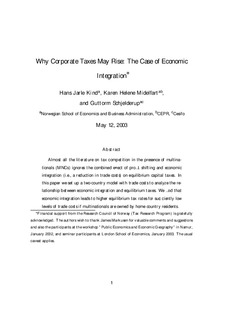| dc.contributor.author | Kind, Hans Jarle | |
| dc.contributor.author | Midelfart, Karen Helene | |
| dc.contributor.author | Schjelderup, Guttorm | |
| dc.date.accessioned | 2006-08-08T07:28:56Z | |
| dc.date.available | 2006-08-08T07:28:56Z | |
| dc.date.issued | 2003-05 | |
| dc.identifier.issn | 0804-6824 | |
| dc.identifier.uri | http://hdl.handle.net/11250/162862 | |
| dc.description.abstract | Almost all the literature on tax competition in the presence of multinationals
(MNCs) ignores the combined effect of profit shifting and economic
integration (i.e., a reduction in trade costs) on equilibrium capital taxes. In
this paper we set up a two-country model with trade costs to analyze the relationship
between economic integration and equilibrium taxes. We find that
economic integration leads to higher equilibrium tax rates for sufficiently low
levels of trade costs if multinationals are owned by home country residents. | en |
| dc.format.extent | 131411 bytes | |
| dc.format.mimetype | application/pdf | |
| dc.language.iso | eng | en |
| dc.publisher | Norwegian School of Economics and Business Administration. Department of Economics | en |
| dc.relation.ispartofseries | Discussion paper | en |
| dc.relation.ispartofseries | 2003:5 | en |
| dc.title | Why corporate taxes may rise : the case of economic integration | en |
| dc.type | Working paper | en |
